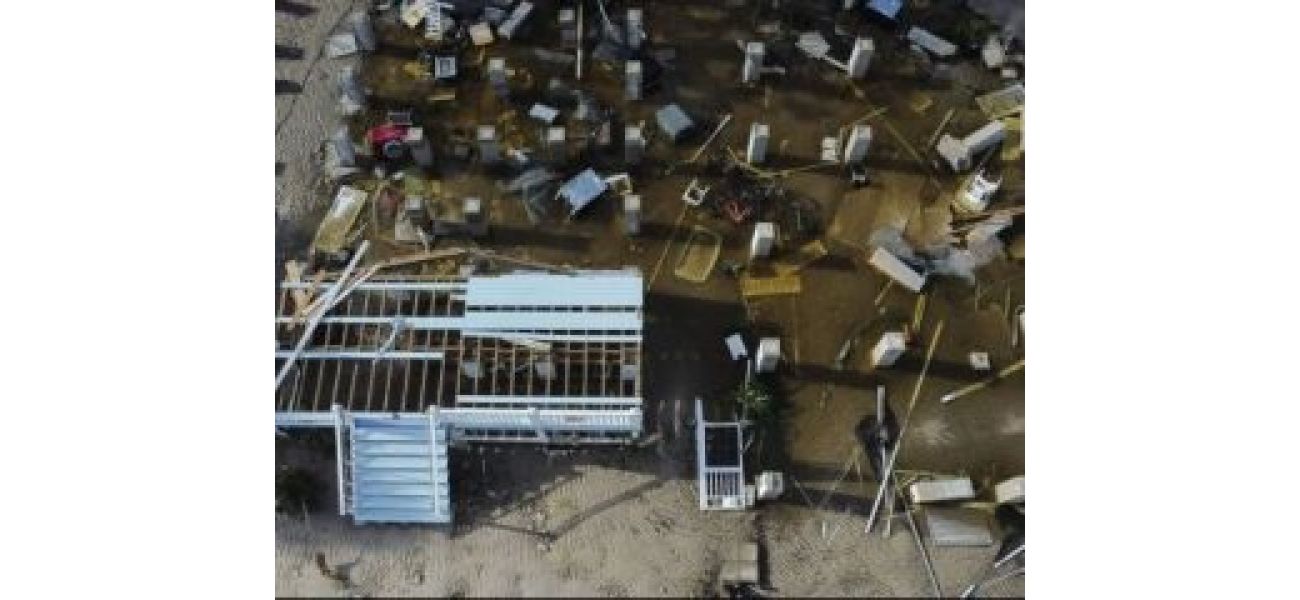Hurricane Helene caused significant damage and power outages as it passed through the southeastern US, resulting in over 50 deaths.
Hurricane Helene caused widespread devastation and power outages in the southeastern US, with at least 52 deaths reported.
September 28th 2024.

Perry reported that Hurricane Helene had left a devastating trail of destruction in its wake. The powerful storm had claimed 52 lives and caused billions of dollars in damages across the southeastern United States. As it ripped through the region, more than 3 million people were left without power and many were still under the threat of flooding.
The hurricane made landfall in Florida's Big Bend region on Thursday night, packing wind speeds of 140 mph and quickly making its way through Georgia, the Carolinas, and Tennessee. The winds uprooted trees, destroyed homes, and caused rivers and creeks to overflow, putting pressure on dams. The aftermath was severe, with Western North Carolina facing landslides and flooding that forced the closure of major roads. The city of Asheville was heavily affected, with sections of the city submerged underwater.
Francine Cavanaugh was worried about her loved ones in the area, as she couldn't reach them due to the lack of communication. Her sister, son, and friends were all in the Asheville area when the storm hit. Cavanaugh's sister had checked in with her before the storm, but since then, she had not been able to get in touch with anyone. She had seen videos of a nearby grocery store completely flooded and feared for the safety of her loved ones.
In East Tennessee, the situation was dire as well. Hundreds of people had to be rescued from the roof of a hospital surrounded by floodwaters. The National Hurricane Center predicted that the storm, now a post-tropical cyclone, would continue to hover over the Tennessee Valley over the weekend. Flood and flash flood warnings were still in effect in parts of the southern and central Appalachian regions, while high wind warnings covered parts of Tennessee and Ohio.
The death toll from the storm had risen to 48, with casualties reported in Florida, Georgia, North Carolina, South Carolina, and Virginia. Among the victims were three firefighters, a mother and her 1-month-old twins, and an 89-year-old woman whose house was struck by a falling tree. The storm had also caused extensive damage to property, with some neighborhoods in Atlanta receiving a record-breaking 11.12 inches of rain in just 48 hours.
Many experts believe that climate change has contributed to the intensity of storms like Helene. The warming oceans provide the perfect conditions for hurricanes to rapidly intensify, turning them into powerful cyclones within hours. Florida's Big Bend region, known for its untouched salt marshes and pine flatwoods, was hit hard by the storm. It's a place where many people, like Susan Sauls Hartway, could afford to live close to the beach. Unfortunately, her home was among the many destroyed by Helene.
Evacuations were issued in many areas, but not everyone heeded the warnings. In North Carolina, a dam near a lake featured in the movie "Dirty Dancing" was overtopped, and surrounding neighborhoods had to be evacuated. Tornadoes also hit some areas, causing critical injuries.
The aftermath of the storm was devastating, with entire communities cut off from the outside world due to flooded roads and landslides. Rescue efforts were underway, but the extent of the damage was still unknown. In Georgia and South Carolina, utility infrastructure was severely damaged, and many residents were left without power. The destruction caused by Helene was immense, and it would take weeks, if not months, to fully recover.
President Joe Biden expressed his condolences and assured those affected by the storm that they were in his thoughts and prayers. The Federal Emergency Management Agency (FEMA) had deployed over 1,500 workers to assist with rescue and recovery efforts. Officials urged people to call for help instead of trying to navigate through dangerous floodwaters.
The aftermath of Hurricane Helene was a reminder of the devastating impact of natural disasters. As the world continues to grapple with the effects of climate change, it's becoming increasingly important to be prepared for such events. The 2021 Atlantic hurricane season had already seen eight named storms, and experts predicted that it would be an above-average season. The only hope is that communities affected by hurricanes and other natural disasters can come together and rebuild stronger and more resilient than before.
The hurricane made landfall in Florida's Big Bend region on Thursday night, packing wind speeds of 140 mph and quickly making its way through Georgia, the Carolinas, and Tennessee. The winds uprooted trees, destroyed homes, and caused rivers and creeks to overflow, putting pressure on dams. The aftermath was severe, with Western North Carolina facing landslides and flooding that forced the closure of major roads. The city of Asheville was heavily affected, with sections of the city submerged underwater.
Francine Cavanaugh was worried about her loved ones in the area, as she couldn't reach them due to the lack of communication. Her sister, son, and friends were all in the Asheville area when the storm hit. Cavanaugh's sister had checked in with her before the storm, but since then, she had not been able to get in touch with anyone. She had seen videos of a nearby grocery store completely flooded and feared for the safety of her loved ones.
In East Tennessee, the situation was dire as well. Hundreds of people had to be rescued from the roof of a hospital surrounded by floodwaters. The National Hurricane Center predicted that the storm, now a post-tropical cyclone, would continue to hover over the Tennessee Valley over the weekend. Flood and flash flood warnings were still in effect in parts of the southern and central Appalachian regions, while high wind warnings covered parts of Tennessee and Ohio.
The death toll from the storm had risen to 48, with casualties reported in Florida, Georgia, North Carolina, South Carolina, and Virginia. Among the victims were three firefighters, a mother and her 1-month-old twins, and an 89-year-old woman whose house was struck by a falling tree. The storm had also caused extensive damage to property, with some neighborhoods in Atlanta receiving a record-breaking 11.12 inches of rain in just 48 hours.
Many experts believe that climate change has contributed to the intensity of storms like Helene. The warming oceans provide the perfect conditions for hurricanes to rapidly intensify, turning them into powerful cyclones within hours. Florida's Big Bend region, known for its untouched salt marshes and pine flatwoods, was hit hard by the storm. It's a place where many people, like Susan Sauls Hartway, could afford to live close to the beach. Unfortunately, her home was among the many destroyed by Helene.
Evacuations were issued in many areas, but not everyone heeded the warnings. In North Carolina, a dam near a lake featured in the movie "Dirty Dancing" was overtopped, and surrounding neighborhoods had to be evacuated. Tornadoes also hit some areas, causing critical injuries.
The aftermath of the storm was devastating, with entire communities cut off from the outside world due to flooded roads and landslides. Rescue efforts were underway, but the extent of the damage was still unknown. In Georgia and South Carolina, utility infrastructure was severely damaged, and many residents were left without power. The destruction caused by Helene was immense, and it would take weeks, if not months, to fully recover.
President Joe Biden expressed his condolences and assured those affected by the storm that they were in his thoughts and prayers. The Federal Emergency Management Agency (FEMA) had deployed over 1,500 workers to assist with rescue and recovery efforts. Officials urged people to call for help instead of trying to navigate through dangerous floodwaters.
The aftermath of Hurricane Helene was a reminder of the devastating impact of natural disasters. As the world continues to grapple with the effects of climate change, it's becoming increasingly important to be prepared for such events. The 2021 Atlantic hurricane season had already seen eight named storms, and experts predicted that it would be an above-average season. The only hope is that communities affected by hurricanes and other natural disasters can come together and rebuild stronger and more resilient than before.
[This article has been trending online recently and has been generated with AI. Your feed is customized.]
[Generative AI is experimental.]
0
0
Submit Comment





